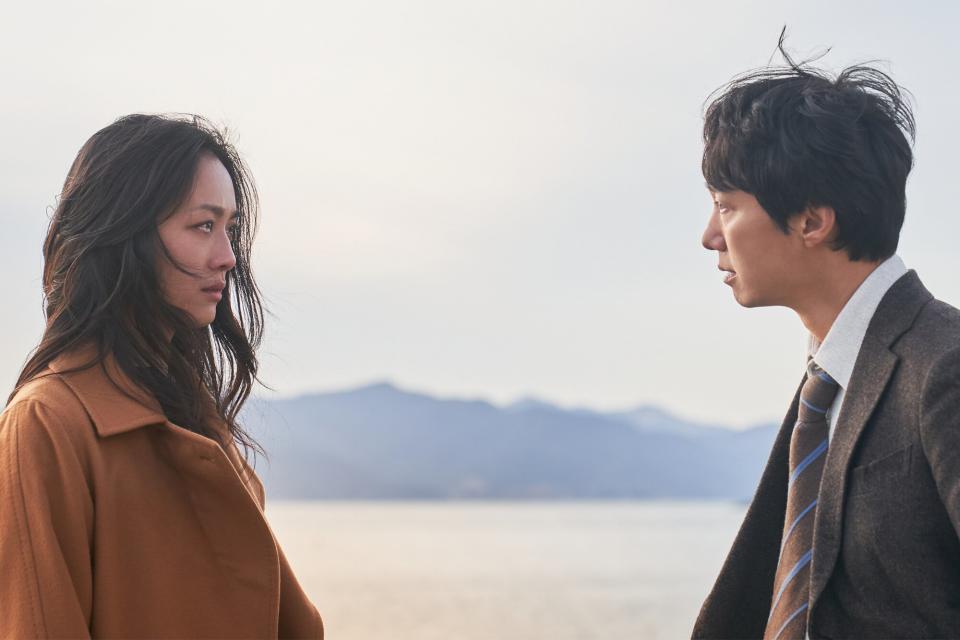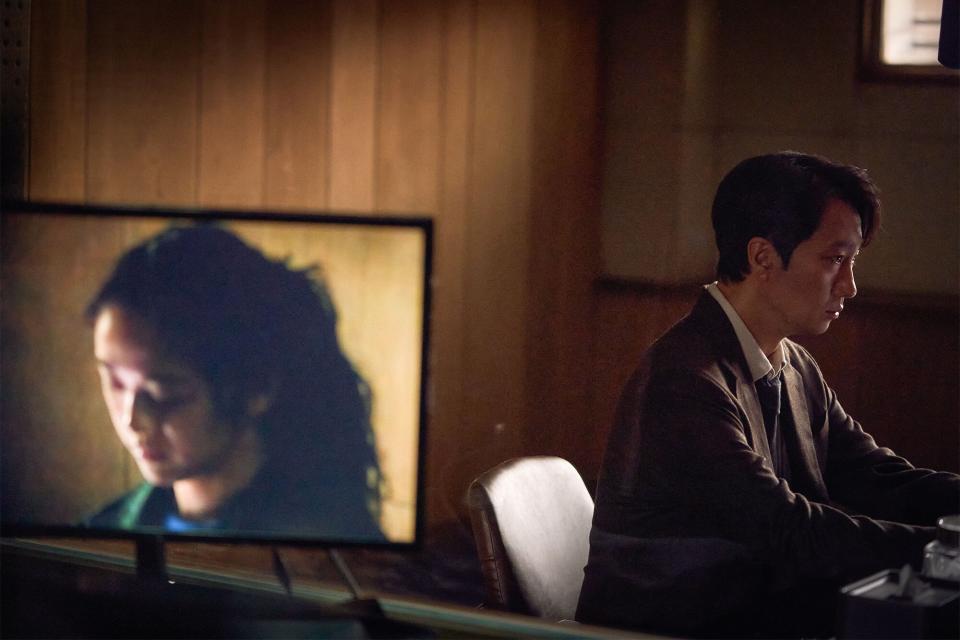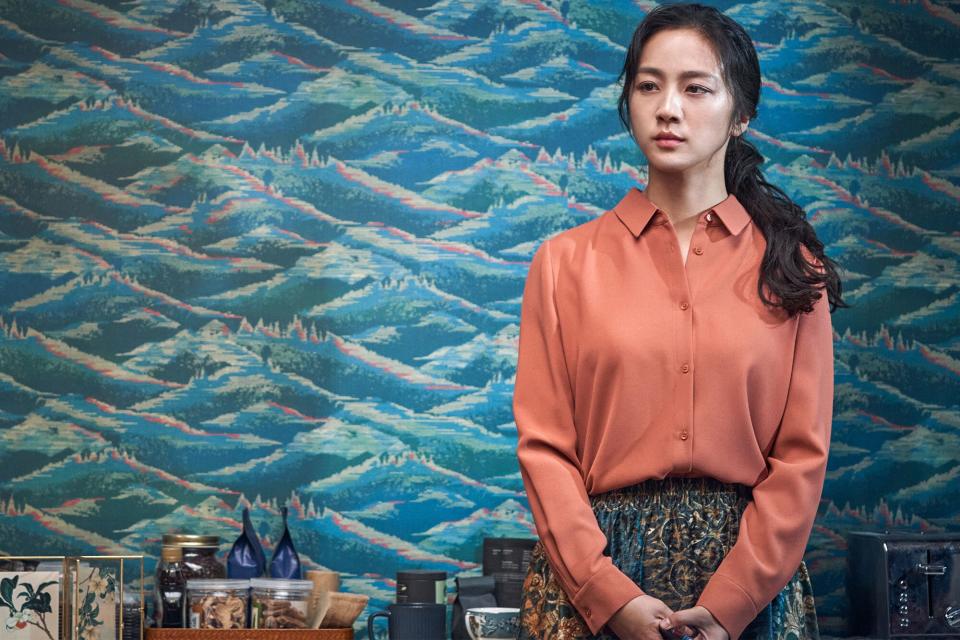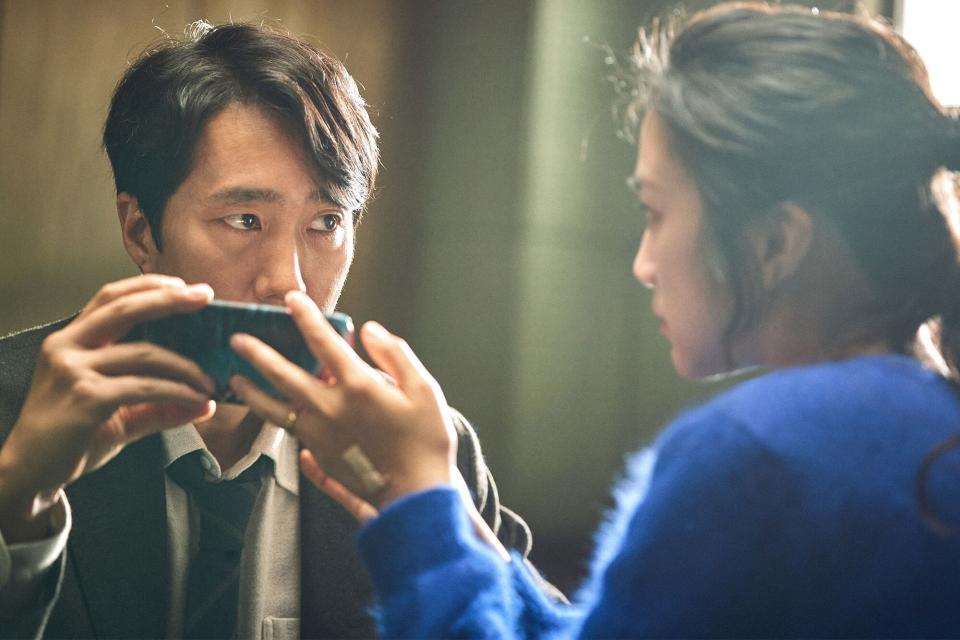Director Park Chan-wook on why Oldboy 's twist remains his favorite
- Oops!Something went wrong.Please try again later.
- Oops!Something went wrong.Please try again later.
- Oops!Something went wrong.Please try again later.
Warning: This article contains spoilers for Decision to Leave and Oldboy.
Murder begets romance in Decision to Leave, acclaimed director Park Chan-wook twisty new mystery. In Park's first feature film in six years, Park Hae-il stars as Hae-joon, a detective tasked to investigate the curious death of a businessman found at the bottom of a mountain peak. The enigmatic widow, Seo-rae (a magnetic Tang Wei), becomes prime suspect No. 1 when she fails to show outward signs of grief while questioned by police. (A moment of laughter during her interrogation also doesn't help.) As Hae-joon digs deeper into the investigation, he and Seo-rae find themselves drawn to each other, setting the stage for a doomed love story filled with much of Park's signature style — and a devastating closing act.
Below, EW speaks to a thoughtful Park about Decision to Leave, plus his past and future projects, including 2003's Oldboy and HBO's upcoming The Sympathizer series.

Mubi Tang Wei and Park Hae-il in 'Decision to Leave'
ENTERTAINMENT WEEKLY: This is your first feature in six years. A detective falling in love with a suspect is a classic film trope. Why did you want to explore this particular storyline?
PARK CHAN-WOOK: I don't think I was thinking about this actively while I was writing, but subconsciously, I think I wanted to begin from a very cliched, classical, basic setting. In that case, the audience has more opportunities to focus on the details. [With a] story about a detective loving his suspect, you don't have to explain the details. You can jump right into the emotions of the story.
There are nods to classic Hollywood, like Alfred Hitchcock's Vertigo, but what were some of the other influences behind Decision to Leave?
I can't really think of one at the top of my head. Even for Vertigo, it was more as if I was subconsciously influenced by it, rather than I was actively trying to think about the movie while I was preparing the story. There is a movie, Brief Encounter, which my co-writer at that time hadn't seen yet, so I recommended the movie to her when we were preparing the movie. And of course, there's the song "Mist," which was actually already used as a soundtrack for a Korean film [1967's Mist]. It's a soundtrack that was specifically made for the movie. So obviously, I watched that film as well. And in that film, there is also a love story that takes place in a mist-filled city. Another source of inspiration was Mikio Naruse's film Yearning, which also tells the story of a man and a woman hiding their emotions while falling in love.

Mubi Park Hae-il and
Decision has a devastating ending, one that refers back to Hae-joon telling Seo-rae to dispose of her dead husband's phone in the sea. Can you tell me more about how you crafted this conclusion?
A long time ago — I want to say 30-plus years ago, before I became a film director — I had an idea for a short film. There's this man, and he digs a hole and he goes inside. And using this complex machinery [and] the entire patch of ground, including the grass and the soil, it goes over his little hole as if you're covering a lid. And it looks like nothing happened. So he leaves no trace of himself, and basically evaporates from the world. The story doesn't really explain why he committed this particular form of suicide. And I never got to film this story. I forgot about the idea for a while. And when I was in the last stage of writing the treatment for Decision to Leave and we were trying to decide how to exit the story, I thought of this old short-film idea, and that felt like the perfect solution for me.
Seo-rae must forever remain an unresolved case to Hae-joon. As shown in the dialogue, Seo-rae wanted Hae-joon to spend sleepless nights looking at a photo of her and thinking about her. This might come off as a cruel kind of emotion, but it was her emotion. So she has to find a way where she can disappear without a trace. And as she is an ocean person, it would be even better if she uses the power of the ocean to achieve this goal. Unlike hanging herself or shooting herself, it's not an active form of suicide where she uses her own power. We are borrowing the power of the ocean. It's also a method of patience. It's a method of waiting and accepting one's fate.
I'm assuming, then, that there weren't any alternative endings, and that you always knew you would end the film this way?
This was the only ending, yeah. But there was a time where I brainstormed an epilogue. Because at that point, I thought to myself: Seo-rae dies like that, and what did Hae-joon lose? I felt like the balance wasn't quite right. So I thought of an epilogue where Hae-joon was completely destroyed. He lost his work as a policeman that he took so much pride in. I did have a time where I brainstormed an epilogue like this, but ultimately, with the ending that we have right now — where Hae-joon can't even tell if Seo-rae is alive or dead, and he's forever cursed to look for her, believing that she is lost — if the audience can imagine this for Hae-joon, then I felt like this epilogue wasn't necessary, and I didn't end up writing it.
What were you hoping to convey with this ending?
I can't really think of a lesson to walk away with because that's not how I make my films. But something I do want to emphasize is that I don't want the audience to think that Seo-rae sacrificed herself to prevent a man from ruining his career or his marriage. Instead, she has chosen a personal, destined way for herself, and this is her method of liberation and to attain freedom for herself. That's how I want the audience to think of the ending.

Mubi Tang Wei in 'Decision to Leave'
Looking back at your past work, you're truly a master of layering plot twists. Out of all of your films, which has been your favorite to craft and why?
Oldboy. It was adapted from a Japanese manga. The producer made a deal to adapt the movie, but I didn't like the ending, so I had to think of a new ending. But I couldn't think of the right one. So while I was discussing this matter with my producer at a cafe, I went to the restroom for a bit. While I was in the restroom, I thought of this this new ending for the film, everything about the incest. So I returned and I described everything to my producer. I can remember this moment so clearly because it was a moment where I explosively thought of so many ideas in such a short amount of time. It really remains a very happy memory for me.
Looking to future projects, you're directing and showrunning a TV adaptation of Viet Thanh Nguyen's novel The Sympathizer, starring Robert Downey Jr. What can you tease about this?
There's the example of Pachinko, certainly, but the fact that there is such a big-budgeted series that features so much foreign language that requires the audience to look at subtitles really represent the change that has happened in the industry. And to those of you who have read the novel already, the general theme and plot remain the same. But a lot of the details I have reworked, and there is a lot more black comedy.

Mubi Park Hae-il and Tang Wei in 'Decision to Leave'
What kind of conversations did you have with Viet and star Robert about bringing this to the screen?
For the author, Viet, we are around the same age. We are both Asian, and there's also that part — the element of how Korea was involved with the Vietnam War. So we had a lot to talk about. With Robert, we had a lot of conversations about how much he sympathizes with the theme of the novel.
Between K-pop, K-drama, and, of course, Parasite's historic Oscar win, South Korean entertainment has become a global phenomenon. Why do you think it resonates so much these days?
I think it's because Korean people are so emotionally expressive. There's a wide dynamic range or spectrum of the emotions that they have. So in their cultural products, they really want to experience all of these different emotions. And these emotions naturally are emotions all people can resonate with, which is why people from other countries are sympathizing with themes or emotions in these works.
But it's not just a blessing that Koreans have such a wide dynamic spectrum of emotions, because this comes from a long, painful history within the country. So you can say in a way, a tragedy has turned into a blessing.
This interview has been edited and condensed for clarity. Decision to Leave hits theaters today.
Related content:

